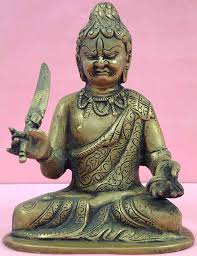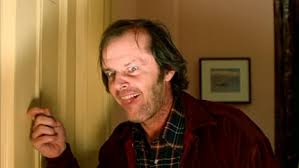Bop with the Buddha the Way Buddha Bops--by Reb MacRath
There are so many faces of the Buddha that it's more than a bit silly when somebody gets in your face about one: the beaming, Christ-like pacifist. And when critics condemn works of art that are false to the face they prefer...things grow worse.
For the Buddha has so many faces. Second only to the PPS (Perfectly Passive Saint) is the PPA (Playful Party Animal).

There are also images of the Angry Buddha, reminding us that Christ himself flew into a rage at one temple:

Even the Buddha acknowledged the humanity of anger:

And it should be obvious that not all Buddhists are Perfectly Passive, as this image attests:

And these:




Recently, though, I was taken to task for a short but graphic passage in my first piece of flash fiction. My antihero had learned just enough martial arts to deal with a thug on the street--ultimately learning that he knew a lot more than he thought. The short-short was character-driven, with an inevitable path to the end. Yet a dear friend, while praising the writing, chastised the violence. A devout Buddhist, he'd studied Tai Chi for a while. And his teacher would never have done such a thing. Never mind that I hadn't written of Tai Chi...or that I'd studied martial arts for fifteen years, under masters who taught fierce survival techniques--including the use of sharp pencils. I respect my friend's opinion, but he read outside the tale this time.
As a matter of fact, Keanu Reeves had made a brutal Tai Chi film that starred his own instructor:

The Buddha has many faces, proved again in the following link::
http://www.bloomberg.com/news/articles/2011-12-09/buddhist-packing-bond-pistol-shows-american-warm-embrace-of-guns
But on to the heart of this essay: the belief in certain quarters that writers whose books feature violence are: 1) not really Serious Writers; or 2) borderline psychotics.




Let's address each of those charges in turn:
1) Can books or films with violence be taken seriously? Homer's two epics are still read and studied round the world though the violence--especially in The Iliad--is extreme and unrelenting. The Odyssey concludes with a slaughter that's hard to justify today. But nobody objects. If cinema had been around, Shakespeare's offstage violence would have drenched the screen in red. Are we wrong to savor masterpieces by Peckinpah and Tarantino? Are we wrong to love grim books by great stylists like James Lee Burke and Richard Monaco (a two-time Pulitzer Prize nominee)? I don't think so. Let's be smart. Books containing violence are no more Bad by definition than is commercial fiction. (Shakespeare wrote for money. And Byron rivaled G B Shaw in his fights for his share of the profits.)
2) Is an author mad or spiritually skewed if his or her work contains violence? Some of the writers best known to the world for their violent or horrific tales are known to be gentle, considerate souls:


Stephen King Peter Straub


David (Rambo) Morrell John (The Fury) Farris
I knew John Farris personally and got to chat with both Straub and Morrell. Of all three men, I can say I felt I had bopped with the Buddha, touched by their warmth and decency.
I sign off with the hope that we all grow less quick to praise only the one face of Buddha we love...or to judge art by standards other than the artist had in mind.
I thank you all for coming as I amble off to bop.
For the Buddha has so many faces. Second only to the PPS (Perfectly Passive Saint) is the PPA (Playful Party Animal).
There are also images of the Angry Buddha, reminding us that Christ himself flew into a rage at one temple:
Even the Buddha acknowledged the humanity of anger:
And it should be obvious that not all Buddhists are Perfectly Passive, as this image attests:
And these:
Recently, though, I was taken to task for a short but graphic passage in my first piece of flash fiction. My antihero had learned just enough martial arts to deal with a thug on the street--ultimately learning that he knew a lot more than he thought. The short-short was character-driven, with an inevitable path to the end. Yet a dear friend, while praising the writing, chastised the violence. A devout Buddhist, he'd studied Tai Chi for a while. And his teacher would never have done such a thing. Never mind that I hadn't written of Tai Chi...or that I'd studied martial arts for fifteen years, under masters who taught fierce survival techniques--including the use of sharp pencils. I respect my friend's opinion, but he read outside the tale this time.
As a matter of fact, Keanu Reeves had made a brutal Tai Chi film that starred his own instructor:
The Buddha has many faces, proved again in the following link::
http://www.bloomberg.com/news/articles/2011-12-09/buddhist-packing-bond-pistol-shows-american-warm-embrace-of-guns
But on to the heart of this essay: the belief in certain quarters that writers whose books feature violence are: 1) not really Serious Writers; or 2) borderline psychotics.
Let's address each of those charges in turn:
1) Can books or films with violence be taken seriously? Homer's two epics are still read and studied round the world though the violence--especially in The Iliad--is extreme and unrelenting. The Odyssey concludes with a slaughter that's hard to justify today. But nobody objects. If cinema had been around, Shakespeare's offstage violence would have drenched the screen in red. Are we wrong to savor masterpieces by Peckinpah and Tarantino? Are we wrong to love grim books by great stylists like James Lee Burke and Richard Monaco (a two-time Pulitzer Prize nominee)? I don't think so. Let's be smart. Books containing violence are no more Bad by definition than is commercial fiction. (Shakespeare wrote for money. And Byron rivaled G B Shaw in his fights for his share of the profits.)
2) Is an author mad or spiritually skewed if his or her work contains violence? Some of the writers best known to the world for their violent or horrific tales are known to be gentle, considerate souls:
Stephen King Peter Straub
David (Rambo) Morrell John (The Fury) Farris
I knew John Farris personally and got to chat with both Straub and Morrell. Of all three men, I can say I felt I had bopped with the Buddha, touched by their warmth and decency.
I sign off with the hope that we all grow less quick to praise only the one face of Buddha we love...or to judge art by standards other than the artist had in mind.
I thank you all for coming as I amble off to bop.
Comments
Then there’s the idea that all violence is bad, but how can you have creation without destruction? Of course, hurting innocent and good people is bad. But doesn’t that also allow for the opposite—that hurting bad people is good?
I also think that, when it comes to writing, readers have a hard time separating the art from the artist. What comes out on the page is only a reflection of the truth of human existence. There is violence in the world, and a world without violence will only be found within the workings of a utopia mind. Our fiction must reflect the hard truths of life for us to move anyone with our words. And when it comes down to it, better the violence remains on the page, locked up tight in the pages of a book.
Also, I'm fairly partial to the pirate face of Buddha:
http://etsyitemoftheday.com/wp-content/uploads/2009/05/pirate-buddha-notecard.jpg
Lev, thank you. I'll take a look at GOSPEL. Important point about the varied faces not being wrong or hypocritical. The wrongness, I think, comes about when one imposes itself on another.
Richard Monaco - not a robot.